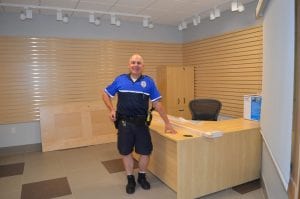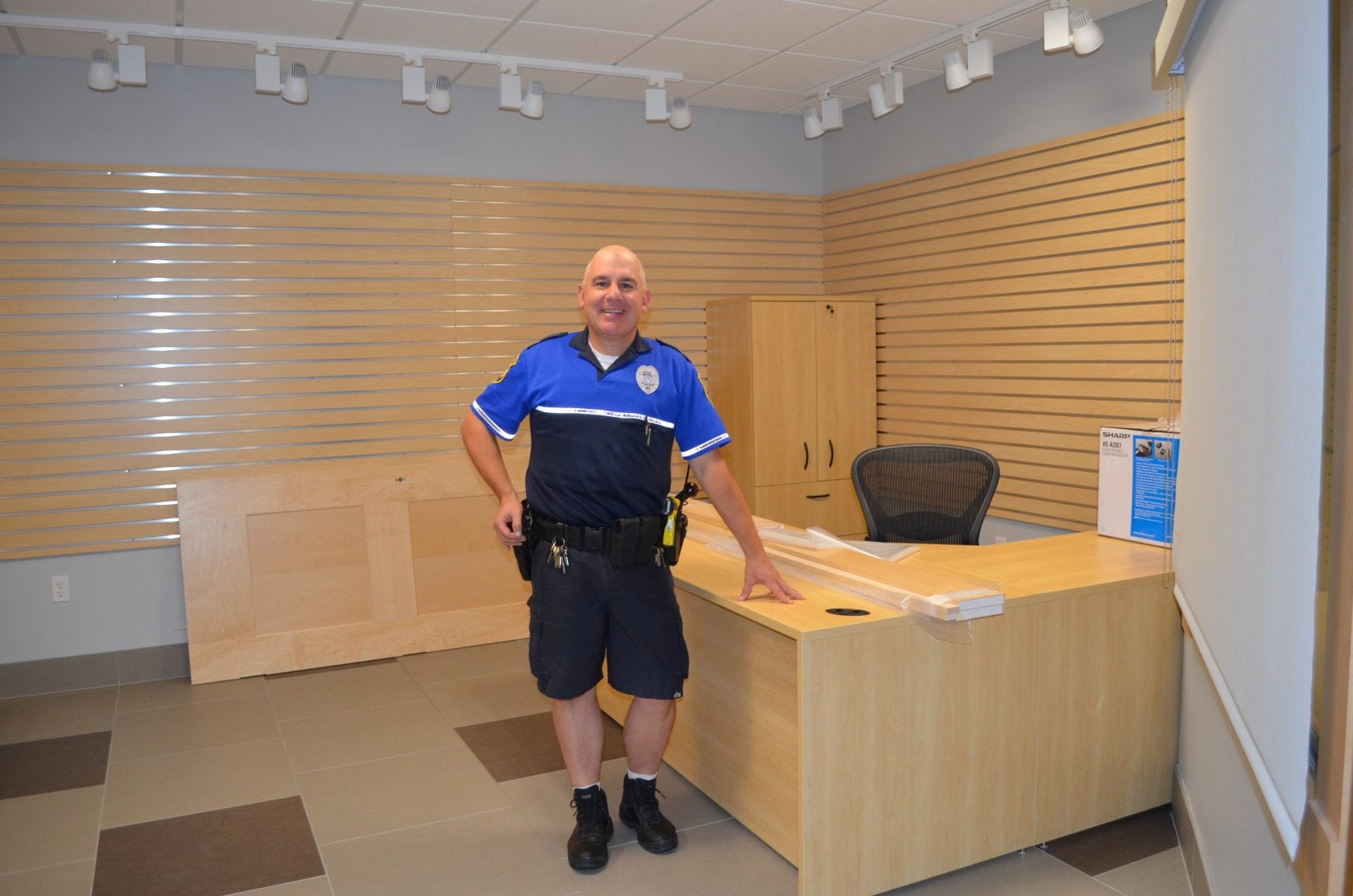WESTFIELD-Creating an informal and comfortable setting for the Senior Safety Office at the Westfield Senior Center remains a top priority for Westfield police officer Mark Carboneau.
With the first year anniversary of the opening of the office fast approaching, Carboneau and Tina Gorman, executive director, Westfield Council on Aging (COA), look back – and ahead – to the strides made for seniors.

Westfield police officer Mark Carboneau will soon mark one year of responding to inquiries at the Senior Safety Office at the Westfield Senior Center. (File photo)
“As the number of older adults in the city increases, so too do the number of cases requiring police involvement,” said Gorman. “It has been the experience of the Council on Aging staff that our request for police involvement and their request for our involvement often involves issues related to housing, mental health, protective services, scams, dementia, driving, and interpersonal relationships.”
Carboneau, a member of the department’s Community Service Unit, added that many of the issues are advisory in nature.
“They are rather informal and no log is kept,” said Carboneau. “However, if a matter involves police action, then it is documented in the police records.”
Gorman noted the initial idea behind the Senior Safety Office was to provide an opportunity for seniors to ask questions and share concerns with a police officer.
“The vast majority of concerns have to do with fraud and scams, especially letters and bills that arrive in the mail and telephone scams,” said Carboneau. “Often the seniors will bring in mail to review or relate a telephone call and ask if it is legitimate.”
Other “issues” involve city ordinance violations, drugs and smoking in senior housing complexes, tenant and landlord problems, and consumer complaints.
All inquiries are processed through the Council on Aging which operates weekdays from 8:30 a.m. – 4:30 p.m. Persons may stop in and relay a message to a staff member or call (413) 562-6435. After hours, all emergency calls should be placed to the Westfield Police Department.
“Sometimes the senior meets with Officer Carboneau directly,” said Gorman, noting he does not have regularly scheduled office hours at the senior center. “Sometimes the concern is made to a COA staff member who suggests that it be brought to Officer Carboneau’s attention.”
Gorman added that a meeting may be required between Carboneau, the staff member, the older adult, or both.
“The person who made the initial inquiry is always involved in the process,” said Gorman, adding the people involved depends on the magnitude and complexity of the problem. “Officer Carboneau is generally at the senior center for a period of time on the days that he is on duty.”
Well-being checks have also been conducted together by Carboneau and Gorman in the past year, and in some cases, initiated by the COA staff or senior center participants.
“If a participant is a ‘regular’ and suddenly stops coming to the center and friends can’t reach the person by phone, that is cause for concern,” said Gorman.
Carboneau added that this scenario is particularly true for senior center participants who have limited or no family involvement.
“We’ve also done checks on seniors because neighbors have called who were concerned about an older adult’s safety,” said Carboneau.
Gorman said in some cases a senior may have been hospitalized or is at a skilled nursing facility.
“Sometimes we have found cases of self-neglect,” said Gorman. “In that case, the COA Outreach Coordinator, Joanne Ortegas, gets involved and begins the process of case management. Arranging for home care services may be a tremendous help.”
Ultimately, both Gorman and Carboneau said that city residents who are “proactive” in their approach to an issue can help to keep problems from “getting out of control.”
“A well-being check may be the difference between life and death for an older adult who is vulnerable and considered at-risk,” said Gorman. “Resolving a tenant and landlord issue may prevent an eviction notice, or working on a consumer complaint may avoid collection or a lawsuit.”
As the Nov. 2 anniversary date approaches, both Gorman and Carboneau agree that locating a Senior Safety Office at the senior center provides better access to police involvement and/or guidance for both the COA staff as well as the older adults who frequent the center.
“Our combined resources and expertise are utilized more efficiently and effectively than working independently,” said Gorman. “Additionally, staff in each department now has a greater awareness of the challenges, limitations, and parameters of our respective roles.”








